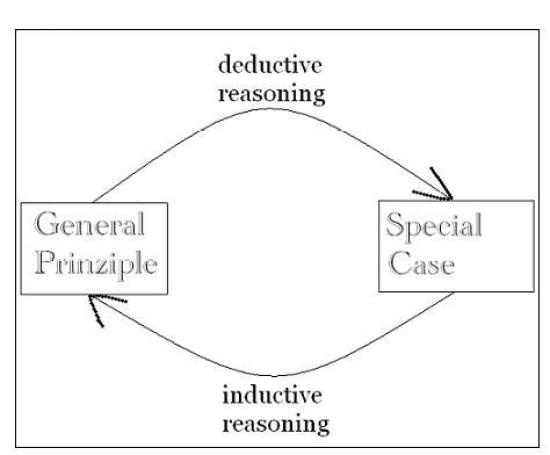What Is Deductive Reasoning In Research? Know All About It
In a research work, there are two types of reasoning. It includes inductive and deductive reasoning. Both of the research reasoning are used at a large scale. The selection of the reasoning approach depends on the objective of the research. Furthermore, you have to keep an eye on the problem statement of the research. In this way, it becomes easy for you to select one particular type of reasoning approach. In this article, our topic of discussion is deductive reasoning in research.
What Is Meant By Deductive Reasoning?

Deductive reasoning is the approach in which you have to discuss about the association of one variable with the other. As per the topic and problem statement of the research, you have to design a testing variable. Afterwards, you need to see how one variable put an effect on another variable. This all is possible because of deductive reasoning in research. Your assumption or claim can be general or specified. In both cases, you can use deductive reasoning.
Another important aspect related to deductive reasoning is that you can use facts and figures. Based on facts and figures, you can conclude something. Also, make it clear for you that you do not have to explore things in deductive reasoning. For this, it is necessary to understand a clear difference between deductive and inductive reasoning. In deductive reasoning, you can use theorems.
Also Read: Best Methods for Exam Preparation in Distance MA in English Programs
What is Deductive Reasoning in Qualitative Research?
We just discussed two types of reasoning: inductive and deductive reasoning. The deductive type of reasoning requires a hypothesis. In the same way, you have to design a problem statement of your research. Now, based on quantitative research, you can use deductive reasoning in research. But, in the case of qualitative research, you cannot use deductive reasoning. The demand of qualitative research is to deal with subjective data. Also, you have to collect first-hand data in the case of qualitative research. It can be done in different ways. These ways are mentioned below;
- Interview
- Questionnaire
- Survey
- Observation
Whatever you collect through these resources, it should not be in a statistical form. Now, if you have a look at deductive reasoning in research, it does not entertain all of these aspects. On the other hand, inductive reasoning can deal with all such aspects in a good way. In short, deductive reasoning does not contribute to qualitative research.
What is a Deductive Reasoning Example?
Below are some of the examples shared by experts of a dissertation writing company about deductive reasoning in research;
- Effects of Entrepreneurial Leadership on Creative Self-Efficiency of Employees.
Here the independent variable is entrepreneurial leadership, while the dependent variable is creative self-efficiency. You have to see how both of the variables build a relationship with each other.
- Another example of deductive reasoning is ‘How Low Motivation of Employee Influence its Job Satisfaction and Intention to Quit.’
Here the independent variable is low motivation of the employee, whereas the dependent variable is job satisfaction and intention to quit. You have to see how low motivation of employees increases or decreases the satisfaction level of them.
- How Sustainability Practices of Multinational Enterprises Impact Their Growth.
Just like the rest of the two examples of deductive reasoning, you have to pick dependent and independent variables to form this example. Work on deductive reasoning, and you will come up with a logical relationship in between designed variables.
Advantages of Deductive Reasoning
Following are some advantages of deductive reasoning in research;
- The best use of deductive reason is to find casual relationships. Whenever you create a concept related to something, design variables for that. Now with the help of deductive reasoning, you can describe a relationship between both of the aspects. The first aspect is a concept. On the other hand, the second aspect is designed variables.
- In the case of quantitative research, the use of deductive reasoning is fine. Even you can say that deductive reasoning is only possible in quantitative research.
- Whenever you have to evaluate things on a general scale, you are supposed to use deductive reasoning. Here you can get rid of specified tasks and particular conclusions linked with that task.
- In the case of deductive reasoning in research, you can find literature review in large amount. Also, you do not have to put extra effort into finding literature. This is one of the reasons why some researchers prefer to go with deductive reasoning.
- In the long list of advantages of deductive reasoning, one advantage is about the time of completion. In deductive reasoning, you do not require lots of time. So, it works as a pro for you that you can complete your task in a short duration of time. Sometimes you have to deal with some unusual circumstances. In those circumstances, you remain unable to work on your research. Here if your reasoning type is deductive, you would not have to worry much about time duration.
- Deductive reasoning in research is used to avoid the risk factor associated with anything in a research work.
Also Read: Affordable Online Tuition in Pakistan
Disadvantages of Deductive Reasoning
Following are some disadvantages of deductive reasoning in research;
- The con of deductive reasoning is that you cannot use this approach for qualitative research. For qualitative research, you have to go for inductive reasoning. Through inductive reasoning, you can analyse subjective data effectively.
- While working on deductive reasoning, you may get frustrated because of responses. The segment of argumentation can make you feel bad. Many researchers handle it somehow. On the other hand, some may get mentally disturbed for a particular duration of time.
- In deductive reasoning, you can work on probabilities.
- You cannot gauge a particular set of ideas.
- Deductive reasoning in research cannot help you to explore something.
- Another disadvantage is that you cannot use subjective data in deductive reasoning.
Final Thoughts
I hope you are now clear about deductive reasoning in research. Two things matter a lot in deductive reasoning. The first thing is to see whether you have to use deductive reasoning. On the other hand, you have come up with the right set of variables. That is all about deductive reasoning in research.



